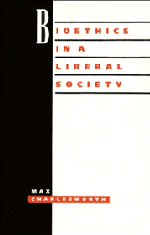3 - ENDING LIFE
Published online by Cambridge University Press: 03 May 2011
Summary
The ethics of suicide
In the Foundation of the Metaphysics of Morals Kant asks himself whether a person may, in certain circumstances, take his life when he judges that his continued existence is humanly pointless. Surprisingly, the great apostle of personal autonomy holds that such a person would be acting immorally. Kant argues that one contemplating suicide is caught in a ‘contradiction’ in that he is, on the one hand, concerned to promote his self-interest by seeking to escape further suffering or dying in a situation where he has lost control over himself and become a ‘vegetable’; but on the other hand he wishes, by taking his life, to abolish his ‘self’ and all possibility of securing his future self-interest. Since what is contradictory is irrational, suicide is irrational. Kant also develops another argument to the effect that a person deciding to commit suicide sees the taking of his life as a means to an end (the cessation of suffering, the avoidance of an ‘undignified’ death). He no longer sees himself as an autonomous moral agent (or person) deserving of absolute moral respect, or as an ‘end-in-itself’, as Kant puts it, that can never legitimately be used simply as a means. Instead, he treats himself as a thing that can be used for other purposes. The would-be suicide is then, for Kant, guilty of a lack of self-respect. Kant's conclusion appears to be that if it is not morally permissible for me to end my life under any circumstances, I have an absolute obligation to preserve my life.
- Type
- Chapter
- Information
- Bioethics in a Liberal Society , pp. 30 - 62Publisher: Cambridge University PressPrint publication year: 1993



